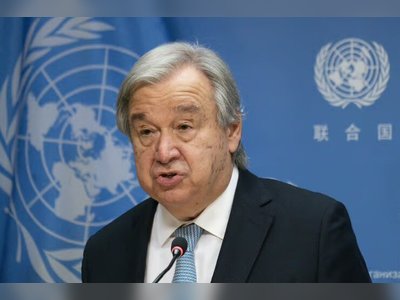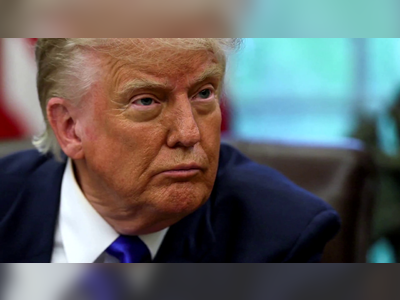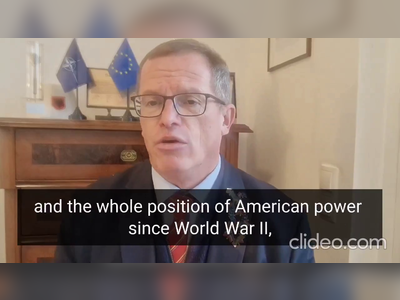
Ursula von der Leyen's Legacy as European Commission President in Question Amidst Re-Election Speculation
Ursula von der Leyen, the first female president of the European Commission, is nearing the end of her first term in office, which has been marked by crises such as the Covid-19 pandemic and the conflict with Russia over Ukraine.
She is known for her work ethic and efficiency, and is seen as a powerful leader with a global voice.
She lives in the European Commission's headquarters in Brussels and is teetotal and a vegetarian.
Angela Merkel's successor as President of the European Commission, Ursula von der Leyen, has been praised for her handling of the Covid-19 pandemic and the crisis in Ukraine.
She has been described as 'arguably the best since [Jacques] Delors' by Belgian Green MEP Philippe Lamberts, who was initially a critic of her but is now converted.
Von der Leyen has delivered on the EU's flagship plan to tackle the climate emergency and stuck with it despite criticism from her own political group.
She faced two consecutive crises, the pandemic and the war in Ukraine, but has learned on the job and has been credited with the 'legacy-creating' €750bn recovery fund to pull the EU's economies out of recession.
However, her personal vaccine diplomacy has been questioned by some inside the commission, with lingering uncertainty over whether the EU got the best deal.
The article discusses the role of European Commission President Ursula von der Leyen in responding to the Russian invasion of Ukraine.
It notes that von der Leyen took the threat seriously from the start and instructed officials to begin preparing sanctions against Russia in December 2021, more than two months before the invasion.
The article also mentions von der Leyen's visit to Kyiv in April 2022 and her announcement that Ukraine was a candidate for EU membership.
It notes that von der Leyen wore a yellow and blue outfit to signal her support for Ukraine and that she has received praise from US officials for her handling of the situation.
The article also mentions criticism of von der Leyen's leadership style, including her focus on crisis management and her decision-making process.
It notes that some of her colleagues have expressed concerns about her handling of certain issues, such as the EU electricity market and the rule of law in Poland.
The European Commission President, Ursula von der Leyen, has a strained relationship with some of her colleagues, particularly with the European Council President, Charles Michel.
Their relationship was further damaged by an incident known as "Sofagate," in which Michel took the only seat available at a meeting with the Turkish president while Von der Leyen was relegated to a sofa.
Despite this, Von der Leyen has managed to achieve some successes in her role, including securing a trade deal with the UK.
However, some critics have criticized her for placing too much emphasis on presentation and not enough on negotiation.
Von der Leyen has not yet announced whether she will seek a second term as Commission President.
The article discusses the possibility of Ursula von der Leyen being re-elected as the President of the European Commission.
The speaker thinks that her cards are good based on what she has done in her first term and that she has a good chance of getting support from the French and Germans, making it difficult to say she shouldn't get a second term.
It is also mentioned that it seems unlikely that von der Leyen will be returning to her chickens in Beinhorn anytime soon.
She lives in the European Commission's headquarters in Brussels and is teetotal and a vegetarian.
Angela Merkel's successor as President of the European Commission, Ursula von der Leyen, has been praised for her handling of the Covid-19 pandemic and the crisis in Ukraine.
She has been described as 'arguably the best since [Jacques] Delors' by Belgian Green MEP Philippe Lamberts, who was initially a critic of her but is now converted.
Von der Leyen has delivered on the EU's flagship plan to tackle the climate emergency and stuck with it despite criticism from her own political group.
She faced two consecutive crises, the pandemic and the war in Ukraine, but has learned on the job and has been credited with the 'legacy-creating' €750bn recovery fund to pull the EU's economies out of recession.
However, her personal vaccine diplomacy has been questioned by some inside the commission, with lingering uncertainty over whether the EU got the best deal.
The article discusses the role of European Commission President Ursula von der Leyen in responding to the Russian invasion of Ukraine.
It notes that von der Leyen took the threat seriously from the start and instructed officials to begin preparing sanctions against Russia in December 2021, more than two months before the invasion.
The article also mentions von der Leyen's visit to Kyiv in April 2022 and her announcement that Ukraine was a candidate for EU membership.
It notes that von der Leyen wore a yellow and blue outfit to signal her support for Ukraine and that she has received praise from US officials for her handling of the situation.
The article also mentions criticism of von der Leyen's leadership style, including her focus on crisis management and her decision-making process.
It notes that some of her colleagues have expressed concerns about her handling of certain issues, such as the EU electricity market and the rule of law in Poland.
The European Commission President, Ursula von der Leyen, has a strained relationship with some of her colleagues, particularly with the European Council President, Charles Michel.
Their relationship was further damaged by an incident known as "Sofagate," in which Michel took the only seat available at a meeting with the Turkish president while Von der Leyen was relegated to a sofa.
Despite this, Von der Leyen has managed to achieve some successes in her role, including securing a trade deal with the UK.
However, some critics have criticized her for placing too much emphasis on presentation and not enough on negotiation.
Von der Leyen has not yet announced whether she will seek a second term as Commission President.
The article discusses the possibility of Ursula von der Leyen being re-elected as the President of the European Commission.
The speaker thinks that her cards are good based on what she has done in her first term and that she has a good chance of getting support from the French and Germans, making it difficult to say she shouldn't get a second term.
It is also mentioned that it seems unlikely that von der Leyen will be returning to her chickens in Beinhorn anytime soon.
AI Disclaimer: An advanced artificial intelligence (AI) system generated the content of this page on its own. This innovative technology conducts extensive research from a variety of reliable sources, performs rigorous fact-checking and verification, cleans up and balances biased or manipulated content, and presents a minimal factual summary that is just enough yet essential for you to function as an informed and educated citizen. Please keep in mind, however, that this system is an evolving technology, and as a result, the article may contain accidental inaccuracies or errors. We urge you to help us improve our site by reporting any inaccuracies you find using the "Contact Us" link at the bottom of this page. Your helpful feedback helps us improve our system and deliver more precise content. When you find an article of interest here, please look for the full and extensive coverage of this topic in traditional news sources, as they are written by professional journalists that we try to support, not replace. We appreciate your understanding and assistance.











